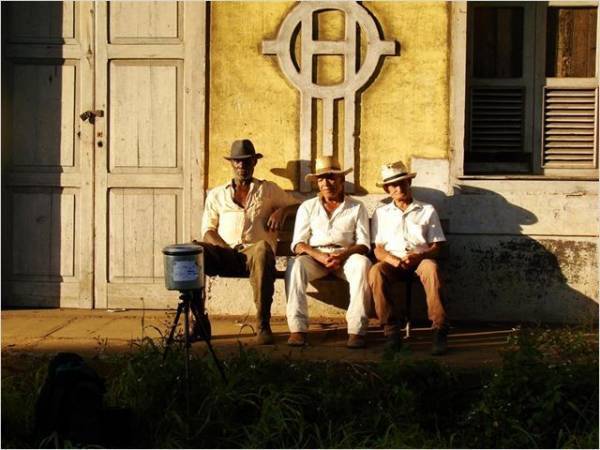 THREE VILLAGERS POSE FOR RITA'S PINHOLE CAMERA IN FOUND MEMORIESMemories that smell of old age and magic
THREE VILLAGERS POSE FOR RITA'S PINHOLE CAMERA IN FOUND MEMORIESMemories that smell of old age and magicIn her
Found Memories/Historias Que So Existem Quando Lembradas Brazilian Júlia Murat has woven a visual poem, delicate, meditative and beautifully tinted in sepia yellow. It's part enhanced documentary, part magic realism. A young woman comes briefly to invade the life of an old lady living in the country. It's a place that declined long ago in the last century due to a coffee crisis. The train doesn't come there any more. Everything is in a photogenic state of natural decay. Which is fine, because Rita (Lisa E. Fávero) is a photographer. She has brought two cameras, one modern with buttons and lights and the other a pinhole camera that is just a tin can. (She seems to favor the latter for the rough hewn effect it gives.)
Every morning the old lady, Madalena (Sonia Guedes) receives an old man, Antônio (Luiz Santos) and they engage in Beckettian ritual squabbling as he fixes coffee and she lays out the rolls she has baked the night before. Sitting on a bench out in front of Madalena's big old ramshackle former shop and house, they squabble like an old couple, talking of loss and rain. But they are not married. They're both widowed.
Rituals continue. Antônio and Madalena go to a service conducted by a grizzled Padre (Josias Ricardo Merkin) and attended by other old people, perhaps a dozen in all, who inhabit this lost, sealed-off village. Later they have a communal lunch, preceded by a long silent prayer. Madalena tends flowers at the entrance of the cemetary -- which is padlocked.
Though it's not spelled out, this was inspired by the director's once coming upon a town whose cemetary really had been sealed off,
so that when people died they had to be taken on a long trip down river to be buried elsewhere. Murat toys with the notion that here, due to the cuttoff of names of deceased persons and the locked burial ground, the old people linger on, unable to die. Toward the end Madalena tells Antônio she's afraid of dying, and he snaps back, "Then don't die." But then Rita, who has won Madalena's confidence and affection, photographs the old lady naked from the waist up. Soon afterward, as if this naked photo was preparation for the hereafter, Madalena dies. It's not clear what this means or how it's handled. (Where will she be buried? Has a spell been broken?) Antônio just says, "Now there's nobody to bake bread."
The beauty of
Found Memories is that, like the films of Lisandro Alonso (whom this picture's dp Lucio Bonelli has worked for) or Carlos Reygadas, Júlia Murat uses unusual authentic settings to weave a special magic. Plotwise, the film is a little thin. Any more morning squabbles between Madalena and Antônio over rolls and coffee and we might go bonkers. But it's amazing how introducing a new young character with a project changes everything. The everyday things, the dark corners, lamp lights, kitchen objects, that seemed merely accoutrements of decline now suddenly as subjects of Rita's camera are beautiful and picturesque. Or at least artsy: Rita's pinhole photos don't seem like masterpieces. But that may be just as well, because when drawings, paintings, or photographs done by a character in film are too professional, they just seem fake. Rita seems a little smug and annoying, but at least she is real. And Madalena greatly brightens, after an initial stonewalling period. with Rita around.
Being young, Rita has a nightlife, even here. She goes and drinks with an old but still feisty black man, Carlos (Antônio dos Santos), and she even dances out there with iPod music. When all the old people dance one evening to the music of an ancient gramophone, that is "magic", not real. When Rita announces she's leaving, Madalena insists she can't -- and perhaps it's by virtue of Rita's visit and departure that Madalena becomes ready to die.
Found Memories is a beautiful slow film, a genre increasingly rich in Latin America. Viewers with patience will find much to enjoy here. It is like a staged photograph, using existing elements judiciously to create a new reality. But its picture of old age as repeated rituals, though not far from the mark, is not quite the whole story. Nor in this first feature does Murat manage a story that is as as specific or as profound as it might have been. With its weathered buildings and locals and its chiaroscuros it's a pretty picture, but it doesn't make much of an impression. It risks not being remembered, and therefore not existing. Though not a direct translation,
Found Memories is a good title for the film. But it reminds us of something: memories that are
found somewhere and appropriated may not always feel as authentic as one's own.
The film's Portuguese title translates as "Stories That Exist Only When Remembered." It debuted at Venice, then Toronto, Rotterdam, and other festivals, including San Francisco. Screened for this review at New Directors/New Films, Lincoln Center, March 13, 2012.
Found Memories opens in Lincoln Plaza Cinemas in NYC June 1-12, 2012 and at the San Francisco Film Society June 22-28. It is being distributed in the US by Film Movement, and a US DVD seems likely.





